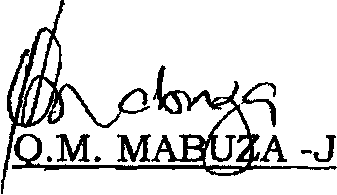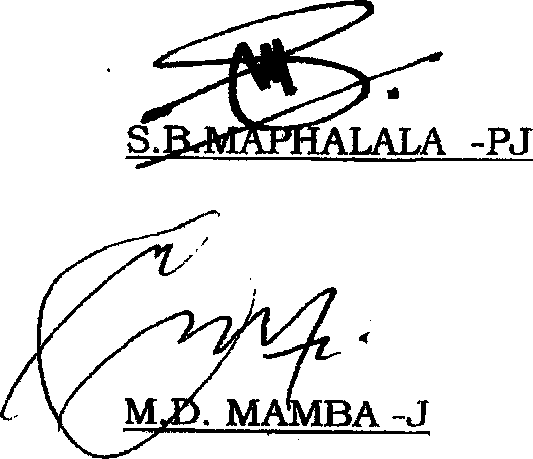IN THE HIGH COURT OF SWAZILAND
HELD AT MBABANE CASE NO. 3353/05
In the matter between:
YONGE NAWE ENVIRONMENTAL ACTION GROUP
APPLICANT
and
THE HONOURABLE MINISTER FOR TOURISM, ENVIRONMENT AND COMMUNICATION THE ATTORNEY GENERAL STEVEN SCOTT MITCHELL
THE SWAZILAND ENVIRONMENT AUTHORITY
1st RESPONDENT 2nd RESPONDENT 3rd RESPONDENT 4th RESPONDENT
CORAM
FOR THE APPLICANT
FOR THE RESPONDENTS
MAPHALALA -PJ, MABUZA MAMBA - J
MR. M. SIBANDZE OF CURRIE AND SIBANDZE MR. MALINDZISA: ATTORNEY GENERAL'S CHAMBERS
JUDGMENT 21/04/09
Mabuza J
The Applicant seeks an order reviewing and setting aside the appointment of the 3rd Respondent, Mr. Steven Scott
Mitchell to the Management Board of the 4th Respondent, the Swaziland Environment Authority (SEA). The Applicant contends that Mr. Mitchell's appointment is ultra vires the Minister's power in terms of the Environment Management Act no. 5/2002. Further, an order declaring the appointment of the board irregular for failure to comply with section 13 (2) (f).
[2] The Respondents oppose the application.
[3] The background hereto is that on the 30th March 2004, the 1st Respondent, the Minister for Tourism, Environment and Communication (the Minister) by publication in the gazette and newspaper requested organisations and associations mentioned in section 13 (6) of the Environment Management Act no. 5 of 2002, including the Applicant to submit nominations for appointment to the Management Board of the Swaziland Environment Authority (SEA). On the 24th June 2004, the Applicant duly submitted a list of nominees for appointment. The Minister appointed Steven Scott Mitchell onto the Management Board of the Environmental Authority. It is the appointment of the 3rd Respondent, Mr. Mitchell that is challenged herein.
[4] I set out hereunder the pertinent provisions of section 13 of Act No. 5 of 2002.
Management Board
"13 (1) The Authority has a Management Board which is the governing body of the Authority with the authority and responsibility to exercise and perform the functions conferred or imposed on the Authority under this Act.
(2)The Board shall, at least, comprise
(f) A person from a non-governmental organisation or association of such organisations which has as a main purpose the promotion of environmental protection and/or the sustainable management of natural resources, ^who shall be appointed from among persons nominated by such organisations."
[5] The argument presented by the Applicant is that the 3rd Respondent (Mr. Mitchell) is not a person from a nongovernmental organisation (NGO) or association of such organisations which has as a main purpose the promotion of environmental protection and/or the sustainable management of natural resources, who shall be appointed from among persons nominated by such organisations in conformity with section 13 (2) (f) stated above.
[6] The Applicant contends that the 1st Respondent is from the Swaziland Association of Architects, Engineers and Surveyors. That the Swaziland Association of Architects Engineers and Surveyors is not an NGO nor is it an association which has a main purpose the promotion of environmental protection and or sustainable management of natural resources.
[7] The 1st Respondent filed an answering affidavit wherein she justified the appointment of the 3rd Respondent. She even raised points of law to fortify her stance that the 3rd Respondent was lawfully appointed into the Management Board of the 4th Respondent (SEA). The points of law raised by the 1st Respondent are: locus standi; prejudice and improper procedure: it being alleged in respect of the latter that the Applicant had not exhausted the dispute resolution provided for in the Environment Act, no. 5 of 2002.
[8] At the hearing of the application, the Respondent advanced the point of law in respect of prejudice and abandoned the other two. The Respondent contended that the Applicant had not stated what prejudice it had suffered as a result of the appointment of the 3rd Respondent to the Management Board or the composition of the entire board. Mr. Malindzisa for the Respondents submitted that section 58(1) of the Environment Management Act No. 5 of 2002 only applies to instances where there has been an act or omission that constitutes a contravention of the Act or that could cause an adverse effect. He contended that the 3rd Respondent was lawfully appointed into the 4th Respondents Management Board and that the Applicants concern was neither in the public interest nor for the enhancement, protection or conservation of the environment. He submitted further that there was no act or omission that had been committed by the 1st Respondent, in contravention of the Act or that was likely to cause any adverse effect.
[9] In response to the argument based on section 58 (1) Mr. Sibandze for the Applicant submitted that the Minister breached the law by appointing the 3rd Respondent illegally. The adverse effect was that a bad message was sent out there that it was alright to breach the law as long as the act or omission did not cause an adverse effect. He argued that the adverse effect was that breaching the law was manifestly wrong.
[10] In response to the argument that the Applicant's concern was neither in the public interest nor for the enhancement, protection or conservation of the environment Mr. Sibandze stated that being in breach of the law is of public interest and that the Minister was setting a bad precedent by so doing and that subsequent ministers would erroneously follow her precedent if she was not challenged and corrected.
[11] We agree with the submissions made by Mr. Sibandze. The point in limine is dismissed.
AD MERITS
[12] In her defence the 1st Respondent stated in her answering affidavit that letters inviting nominations were sent out to various non-governmental organisations and organisations representing industry in compliance with section 13 (2) (f) and 13 (2) (g) of the Act. The public was also invited to make nominations through an advertisement that was published in the Swazi Observer dated 5th March, 2004 and through Legal notice no. 31 of 2004. This was done in compliance with the Act. In response to the invitations, various nominations were received from these organisations and the public at large. The 3rd Respondent was nominated by the Swaziland Association of Architects, Engineers and Surveyors in response to a request for a nomination by the SEA. This was done in compliance with section 13 (2) (f) of the Environmental Management Act No. 5/2002.
[13] Mr. Sibandze has countered the 1st Respondents defence by stating that the provisions of section 13 (2) (f) only empowers the Minister to appoint a Board comprising inter alia "a person from a non-governmental organisation or association of such organisations which has as a main purpose the promotion of environmental protection and/or the sustainable management of natural resources, who shall be appointed from among persons nominated by such organisations" (emphasis added).
[14] Mr. Sibandze argue that the 3rd Respondent was disqualified on two grounds: firstly, he was nominated by the Swaziland Association of Architects, Engineers and Surveyors which is not an organisation as envisaged by section 13 (2) (f). Secondly, the Swaziland Association of Architects, Engineers and Surveyors does not have as its main purpose or any of its aims or purposes the promotion of environmental conservation. He referred the court to the Swaziland Association of Architects, Engineers and Surveyors objects as stated in their constitution and these are:
"2. Objects:
The objects of the Association shall be:
To promote in all their aspects the professions of Architecture, engineering and Surveying within the Kingdom of Swaziland. To seek the advancements of good management of the professions and maintenance of the highest professional and ethical standards amongst its present and future practitioners.
To provide an intellectual, professional and social forum for professionally qualified members, technicians, trainees and guests to discuss the past, present and future practice of the professions and the welfare of the Association's members.
To provide an organised professional viewpoint on all matters affecting the professions within the Kingdom.
To provide guidance to Architectural, Engineering and Surveying technicians and trainees in respect of suitable studies available and guide and encourage the training of Swazi students for the attainment of recognised qualifications.
To establish and maintain a registrar of members in the following disciplines:
Architects
Civil Engineers Structural Engineers
Electrical Engineers Mechanical Engineers
2.5.3 Quantity Surveyors
Land Economists and Valuers
To establish and maintain a register of practising professional firms in their respective disciplines. Each firm shall have an office established for a period of at least 6 months which shall have been and remain under the continuous direct and personal supervision of a professionally qualified person, who shall be a professional member of the Association and registered in the same discipline as the firm. This register shall be made available to Government and any other interested persons.
To establish, regularly update and wherever possible agree with client bodies standard rates for disbursements and travelling expenses and standard minimum fee scales.
To foster and encourage within the Association the establishment of chapters of individual disciplines."
[15] From the aforegoing it is obvious to us that the objects or aims of Swaziland Association of Architects, Engineers and Surveyors main purpose is not the promotion of environmental protection and/or the sustainable management of natural resources.
[16] The 1st Respondent in her answering affidavit further stated that she is vested with the discretion to appoint a member of the Board, and what is considered amongst other things, is the nominees credentials and qualifications and not particularly the organisation from which the nominee is a member. The nominations were accompanied by the curriculum vitaes of the nominees and the 3rd Respondent also submitted his CV, which was taken into consideration before he was appointed to the Board. Amongst other qualifications, he holds an Mphil Environment Management.
[17] It is our view that section 13 (2) (f) does not give the Minister a discretion. It states that the person she appoints "shall be appointed from among persons nominated by such organisations." (emphasis added) Shall has always translated to mean mandatory and may to mean discretionary. It matters not that the 3rd Respondent is endowed with such impressive qualifications, the 1st Respondent erred.
[18] The Applicant also challenged the appointment of the Board as irregular for failure to comply with section 13
(2) (f). Our answer to this challenge is found in section 16 of the Interpretation Act, no. 21 of 1970 which states that:
"Where by law a board... is established, then unless the contrary intention appears, the powers of the board... shall not be affected by:
(b) the fact that it is afterwards discovered that there was a defect in the appointment or qualification of a person purporting to be a member thereof."
The application fails in respect of this challenge.
In the event we hold that the 1st Respondent acted ultra vires her powers in terms of section 13 (2) (f) of Act No. 5 of 2002 in appointing the 3rd Respondent to the Management Board of the 4th Respondent. The appointment of the 3rd Respondent is hereby set aside with costs.

♦

I agree
I agree
Thus delivered at Mbabane on this the ^/ day of frfaT'h 2009.
[1]
Cited documents 2
Legislation 2
| 1. | Interpretation Act, 1970 | 35 citations |
| 2. | Environment Management Act, 2002 | 12 citations |